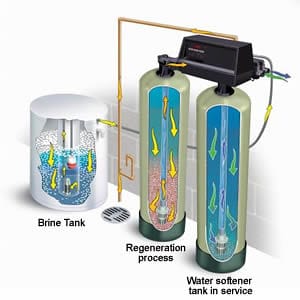
A water softener is a device that removes hardness minerals from water. These minerals include calcium, magnesium, iron and manganese. You can find this information on your water bill or from your local water supplier. Normally these minerals are harmless to humans but can build up in pipes and appliances, causing problems with how they work.
Hardness minerals also make it difficult for soap to lather when used in the bath or shower, which means that you may need to add more soap or shampoo than usual to get clean.
Water softeners are a great way to make your life better. They can improve your health and help you save money on laundry detergent, among other things. But how do they work? Let’s take a closer look!
How Does a Water Softener Work?
Water softeners get rid of hard minerals such as magnesium and calcium by using a slurry of salt and water. Once you’ve installed a water softener, it’s time to start using it. The process is simple:
- Add salt to your water.
- Wait for the salt to dissolve into a slurry and then send that slurry through your faucet using what’s called “brine residual flow.” (This happens automatically when you turn on your faucet.)
- The hardness minerals in your water bond with ions in this brine residual flow as they come out of your faucet, which means they can no longer cause damage or buildup inside pipes or appliances like dishwashers and washing machines!
The machine is filled with salt, which is melted in a heating process. The water then passes through a filter to remove any remaining particles before being softened by the addition of potassium chloride (KCl). This process takes place as you use your water throughout the day.
The amount of KCl needed for this regeneration process depends on your local water hardness level and how much water you use during each regeneration cycle. For example, if you have really hard water and only run one load of laundry per week then it will take less time for the softener to regenerate than someone who lives in an area where there’s not much mineral content in their tap water would need to do so before running out again!
A Water Softener Can Make Your Life Easy
So, let’s say you have hard water. What does that mean for you?
Your skin and hair may be drier than usual. If your skin is dry and itchy, hard water could be the culprit. The mineral buildup in hard water can also cause a buildup on your face and body, leading to redness or irritation if left untreated (or even worse: acne).
Limescale build-up in your sink or bathtub drain pipes can cause clogs that lead to costly repairs down the road, not to mention the frustration of dealing with these issues every time they come up!
If this sounds familiar, then consider investing in a water softener today! Many models come with an automatic drain maintenance feature that automatically flushes out excess minerals from plumbing lines every month or so. A water softener can also help prevent limescale from forming again soon after installation is complete so no more calls from plumbers needed either!
If you think that your water could use some softening, it’s worth looking into. You never know what kind of benefits a softener can bring to your life until you try it out for yourself! You can reach out to us for more details regarding the installation of a water softener.
